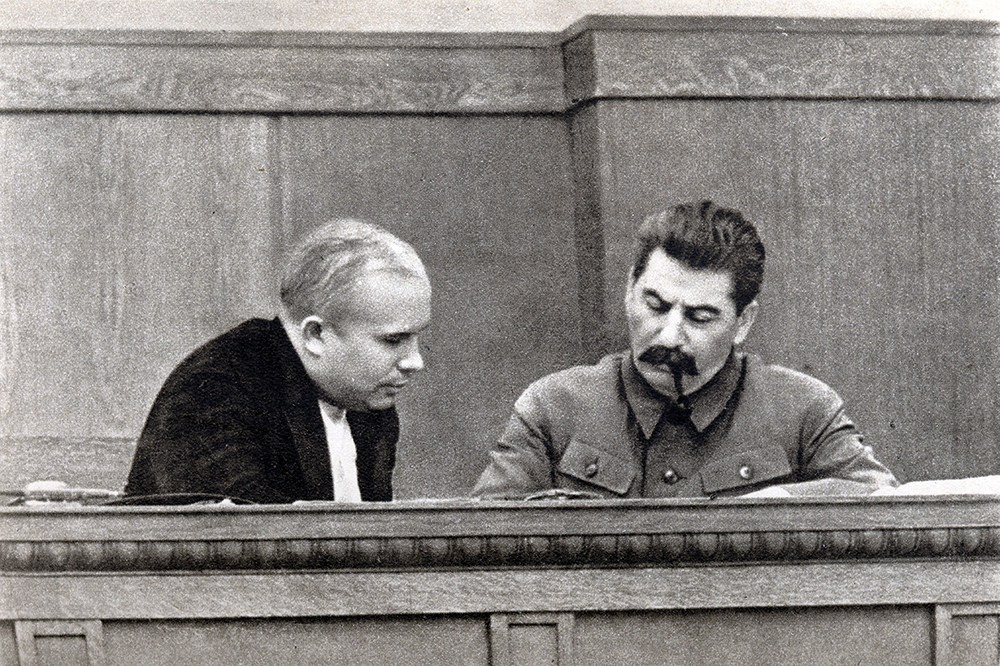
Over a few short months after the defeat of Nazism in May 1945, the ‘valiant Russians’ who had fought alongside Britain and America had ‘transformed from gallant allies into barbarians at the gates of western civilisation’. So begins Vladislav Zubok’s thorough and timely study of the history of the Cold War – or, as he nearly entitled the book, the first Cold War. For the themes that underpinned and drove that decades-long global conflict – fear, honour and interest, in Thucydides’s formulation – are now very contemporary questions. ‘The world has become perilous again,’ writes Zubok, a Soviet-born historian who has spent three decades in the West:
Diplomacy ceases to work; treaties are broken. International institutions, courts and norms cannot prevent conflicts. Technology and internet communication do not automatically promote reason and compromise, but often breed hatred, nationalism and violence.
Historians tend to be wary of drawing direct parallels between the present and the past, and Zubok is too wise to arrive at any glib conclusions. The bulk of this concise, pacy book is a narrative history of the postwar world and the great superpower rivalry that defined it. Yet, as we face a new period of strategic realignments, it’s inevitably to the dynamics of the Cold War we must look for a mirror of our times.
There are many surprises – one being that Joseph Stalin and his entourage had been expecting their wartime alliance with London and Washington to be followed by a period of cooperation. ‘It is necessary to stay within certain limits,’ recalled the Soviet foreign minister Vyacheslav Molotov. ‘[If you swallow too much] you could choke… We knew our limits.’ Stalin, unlike his rival Trotsky, had never been a believer in world revolution and indeed shut down the Communist International during the war. Zubok argues that the Cold War was caused by ‘the American decision to build and maintain a global liberal order, not by the Soviet Union’s plans to spread communism in Europe’.
Yet nearly four years of nuclear imbalance between Hiroshima and the first Soviet A-bomb test fuelled Stalin’s paranoia. And a bloody hot war in Korea could very easily have escalated into a third world war had Douglas MacArthur been given his way and dropped nukes on Pyongyang. Stalin’s successor, Nikita Khrushchev, revived international communism as a fifth column weapon against the capitalist world as the Cold War got into full swing. The great power rivalry became the wellspring for every post-colonial conflict, from Cuba to Angola, Mozambique, El Salvador and the rest.
Zubok argues that the Cold War was caused by ‘the American decision
to build a global liberal order’
But what is surprising is that, despite propagandists’ eschatological framing of the conflict as a fight to the death between rival worlds, there were always pragmatists at the pinnacles of power in both Moscow and Washington. Khrushchev and Richard Nixon, vice president at the time, had heated but cordial man-to-man debates in an American show kitchen at Sokolniki Park in Moscow. Even the arch-apparatchik Leonid Brezhnev became ‘a sponsor and a crucial convert from hard line to détente’ early in his career, writes Zubok. And the great Cold Warrior Ronald Reagan was a surprising champion of jaw-jaw over war-war.
Some of Zubok’s assertions are puzzling. Rather than the USSR simply ‘running out of steam’, its collapse was ‘triggered by Gorbachev’s misguided economic reforms, political liberalisation and loss of control over the Soviet state and finances’. But that formulation suggests that it was Gorbachev’s choices that crashed the ship of state – and raises the possibility that had he not embarked on his reform programme the fate of the USSR might have been different. But Yegor Gaidar, Yeltsin’s economic reformer-in-chief, demonstrated in his classic 2007 study Collapse of an Empire that the implosion followed the iron laws of capitalism. The leaky bucket of the Soviet economy had been kept artificially full by high post-1973 oil prices but began to drain fatally after the Saudis collapsed prices a decade later. The USSR could not feed itself without buying US and Canadian grain for petrodollars. Gorbachev or no Gorbachev, the economy was doomed once the oil money dried up.
Where Zubok gives Gorbachev credit is in the relative bloodlessness of the loss of the Soviet empire, a world-historical achievement that has long been ignored by modern Russians. Today, Gorbachev is reviled by his countrymen as a traitor and a fool who allowed himself to be taken in by American lies. Yet it is he who is the truly vital character on which any useful comparison between the first and (possibly) second Cold Wars hinges.
The first Cold War was, as the Harvard political scientist Graham Allison has argued, born of the ‘Thucydides Trap’, whereby war emerged from the fear that a new power could displace the dominant one. But Gorbachev envisioned a world where competition for influence and resources would be replaced by cooperation. Rivalry did not have to mean enmity. Zero sum can be replaced by win-win.
Sadly, neither Vladimir Putin (who is merely cosplaying as a superpower leader) nor Xi Jinping (who actually is one) have shown anything like Gorbachev’s collaborative wisdom. But we can only live in hope that The World of the Cold War is ‘a record of dangerous, but ancient times’, as Zubok puts it, rather than a warning for the future.
Often seen as an existential battle between capitalist democracy and totalitarian communism, the Cold War has long been misunderstood. Drawing on years of research, and informed by three decades in the USSR followed by three decades in the West, Zubok paints a striking new portrait of a world on the brink.








Comments